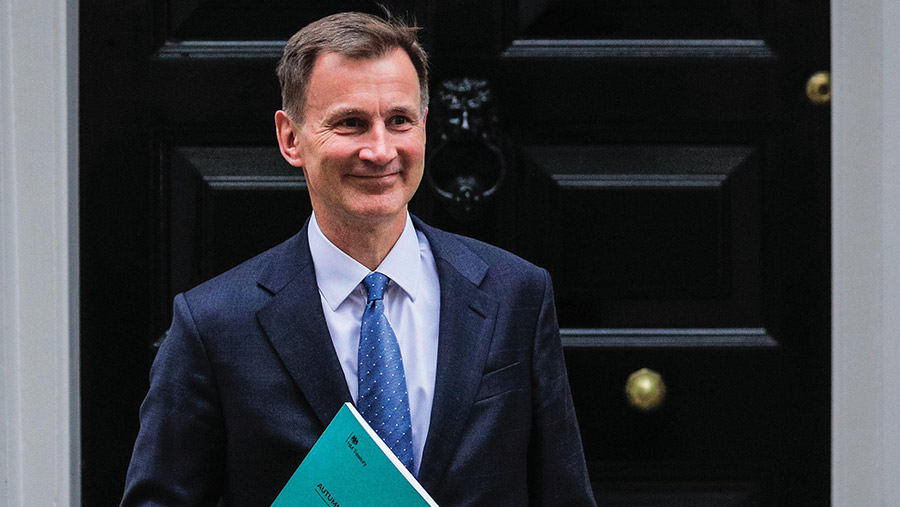Higher wage costs offset tax gains in chancellor’s Autumn Statement
 © Imageplotter/Alamy Stock Photo
© Imageplotter/Alamy Stock Photo Chancellor Jeremy Hunt’s Autumn Statement to the House of Commons on Wednesday (22 November) contains both positives and negatives for farmers and rural businesses, who may enjoy lower taxes, but also face higher wage bills.
In what he termed the “single biggest business tax cut in modern British history”, Mr Hunt confirmed a permanent extension to “full expensing” – whereby investment in capital equipment can be used to reduce corporation tax at 25%.
“It means we have not just the lowest headline corporation tax rate in the G7, but its most generous capital allowances,” he said.
See also: Advice on managing farm business cash flow
Sam Kirkham of accountants Albert Goodman agreed the move would help some corporates, but was disappointed it did not extend to non-corporate entities or include other capital allowances, such as for farm structures and buildings.
National insurance
There were further benefits for the self-employed, “including farmers who put food on our plates”, with the chancellor announcing the abolition of the £3.45/week Class 2 national insurance charge for people earning more than £12,570.
And people paying Class 4 national insurance charges on earnings of between £12,570 and £50,270 will also see that cut by 1% to 8%. The combined benefit is put at a maximum £569 per person a year from next April.
Ms Kirkham described the move as “fairly insignificant”, adding that it only applied to profitable businesses.
“If you are making less than £6,725 in profit per person, or no profit at all, you will still have to make voluntary national insurance contributions to qualify for a state pension,” she said.
The bigger change was in relation to national insurance for employees, where Mr Hunt announced a cut from 12% to 10% from 6 January 2024 – a saving of £450 for someone earning £35,000.
While primarily of benefit to farmworkers, Catherine Vickery of the Old Mill Group of accountants said some farmers who employ themselves through a company structure could benefit, too. It might also be worth considering moving to payment by salary rather than by dividend, she suggested.
Wage cost increases
During the Autumn Statement, Mr Hunt also confirmed a significant increase in the national living wage for workers aged 21 and over, taking the hourly rate from £10.42 to £11.44, adding about £1,800 to a typical annual wage bill.
The move will be a particular challenge for those in the fresh produce sector.
“Employment costs for our members amount to about 60-65% of total production costs,” said Jack Ward, chief executive of the British Growers Association.
“When people are making margins of less than 2%, or no margins at all, then that will have to come from somewhere – in other words, increased food prices to consumers.”
Failure to achieve this would exacerbate shortages of some winter vegetables, such as broccoli and cauliflowers, with a consequent increase in imports.
Inheritance tax and planning
Peter Griffiths, tax director with accountants Hazlewoods, said it was disappointing there was no reduction in inheritance tax liabilities, which had been flagged up before the statement.
This would have been of interest to farmers and landowners, especially those with diversification projects that may not qualify for agricultural property relief or business property relief.
“Linked to that, and hidden in the detail, was that the government will report back on the consultation on the tax treatment of natural capital, which hopefully will include some clarification on the availability of agricultural property relief, in the spring.”
Meanwhile, Victoria Vyvyan, president of the Country Land and Business Association, welcomed measures to help speed up the planning system and provide extra funding for house-building.
“Government has been talking about planning and housing reform for decades,” she said. “It now needs urgently to deliver on its promises.”
